Federal Education Department proposes allowing guns in schools
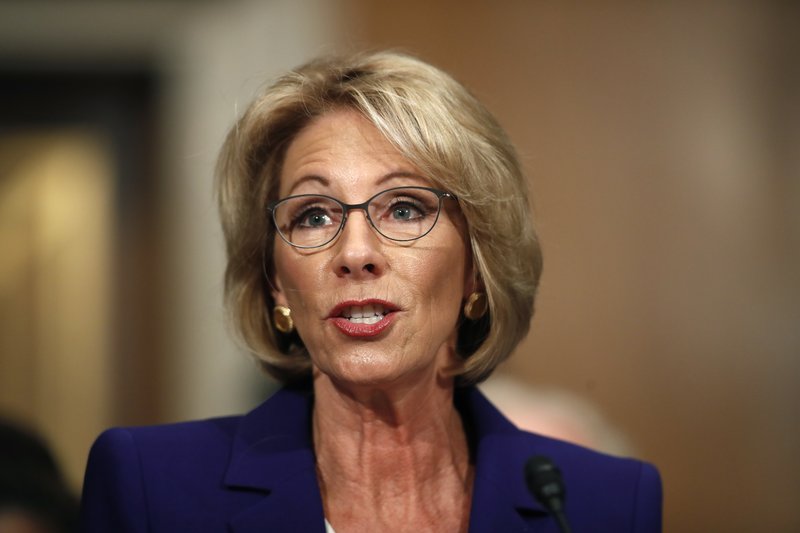
The Education Department says it is weighing whether to allow states to use federal funds to purchase guns for schools, prompting a storm of criticism from Democratic lawmakers and educators. If approved, the plan would likely generate a lot of controversy at a time when a string of especially deadly school shootings earlier this year led to the rise of a powerful student-led gun control movement. A senior Trump administration official told The Associated Press on Thursday that the agency is reviewing legislation governing federal academic enrichment grants to see if the money can be used to buy firearms. The official, who spoke on condition of anonymity because the person was not authorized to discuss the issue publicly, said the bipartisan Every Student Success Act, passed in 2015, does not expressly prohibit or allow the use of Student Support and Academic Enrichment Grants for the purchase of firearms. The official said the agency received several letters asking it to clarify what those funds could be used for and began researching the issue. Education Secretary Betsy DeVos, who chairs a federal commission on school safety, has previously said that schools should have the option to arm teachers. The commission, formed in the aftermath of the school shooting in Parkland, Florida, that killed 17 people, has been criticized for omitting the topic of gun control. The plan, first reported by The New York Times, prompted swift condemnation from Democratic lawmakers and many educators on Thursday, who accused the Trump administration of wanting to deprive students of much-needed mental health support and other resources in the interests of the National Rifle Association. House Minority Leader Nancy Pelosi, D-Calif., called the idea “one of the most egregious, short-sighted and dangerous executive branch abuses of our education system in modern history.” “Secretary DeVos continues to lead an anti-student and anti-teacher campaign on behalf of special interests and the NRA that rejects proven and effective initiatives to ensure a safe, welcoming school climate for children,” she said. Democratic Sen. Chris Murphy of Connecticut, which was the site of the Sandy Hook school shooting, swiftly introduced an amendment that would block the Education Department from using the funds to arm schools. “The Secretary of Education cares more about the firearms industry’s bottom line than the safety of our kids, and that should scare parents to death,” he said. Randi Weingarten, president of the American Federation of Teachers, accused DeVos of trying “to do the bidding of the National Rifle Association and gun manufacturers.” “Instead of after-school programs or counselors, programs that are critical for creating safe and welcoming schools and addressing the mental health needs of kids, DeVos wants to turn schools into armed fortresses and make kids and educators less safe,” Weingarten said in a statement. “She wants to turn the U.S. government into an arms dealer for schools. That’s insane,” she added. Martin West, professor of education at Harvard University, expressed skepticism. “It seems very hard to imagine that members of Congress drafting Title IV envisioned that the funds would be used to arm teachers,” West said. One of the requests for clarification came from Texas, where many school districts allow staff to carry weapons on campus. The Texas Education Agency said in a statement Thursday that it asked Washington for guidance in April after schools started asking whether they can use the grant money to cover the cost of guns. The problem took on even greater urgency in Texas after 10 people were killed in a school shooting outside Houston in May. Republished with the permission of the Associated Press.
Trump administration proposes car-mileage rollback; states sue in protest
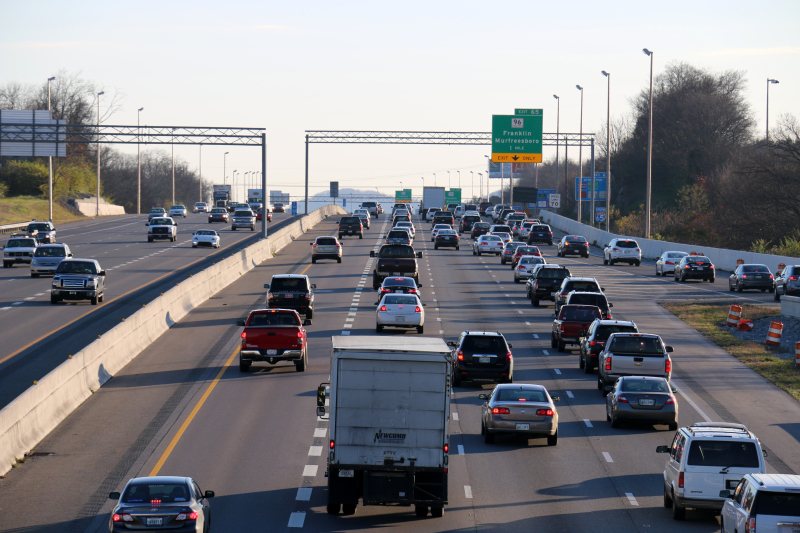
Citing safety, the Trump administration on Thursday proposed rolling back car-mileage standards, backing away from years of government efforts to cut Americans’ trips to the gas station and reduce unhealthy, climate-changing tailpipe emissions. If the proposed rule becomes final, it could roil the auto industry as it prepares for new model years and weaken one of the federal government’s chief weapons against climate change — regulating emissions from cars and other vehicles. The result, opponents say, will be dirtier air and more pollution-related illness and death. The proposal itself estimates it could cost tens of thousands of jobs — auto workers who deal with making vehicles more fuel efficient. The administration also said it wants to revoke an authority granted to California under the half-century-old Clean Air Act to set its own, tougher mileage standards. California and 16 other states already have filed suit to block any change in the fuel efficiency rules. “The EPA has handed decision making over to the fossil fuel lobbyists…the flat-Earthers, the climate change deniers,” said Massachusetts Attorney General Maura Healey. The proposal would freeze U.S. mileage standards at levels mandated by the Obama administration for 2020, when the new vehicle fleet will be required to hit an average of 30 miles per gallon in real-world driving. The proposed change, halting further improvement requirements, stakes its case on consumer choice and on highway safety claims challenged by many transportation experts. The administration says waiving requirements for greater fuel efficiency would make cars and light trucks somewhat more affordable. And that, it said, would get vehicles with the latest technology into the hands of consumers more quickly. It’s got “everything to do with just trying to turn over the fleet … and get more clean and safe cars on the road,” said Bill Wehrum, assistant administrator of the Environmental Protection Agency. The administration will now seek public comment on its proposal and a range of other options, including leaving the tighter, Obama fuel standards in place. Some Republican lawmakers supported the mileage freeze, but environmental groups and many states assailed it. “This has to be absolutely one of the most harmful and dumbest actions that the EPA has taken,” said Healey of Massachusetts, one of the attorneys general from 19 states and the District of Columbia objecting to the change. “It’s going to cost drivers here and across the country hundreds of millions of dollars more at the pump.” The EPA under President Barack Obama had proposed mileage standards that gradually would become tougher, rising to 36 miles per gallon in 2025, 10 mpg higher than the current requirement. California and the automakers agreed to the rules in 2012, setting a single national fuel economy standard. Soon after taking office, President Donald Trump called for a rollback, urging “common sense changes” if the mileage requirements threatened auto industry jobs. However, his administration’s report on Thursday projects that relaxing mileage standards would cost 60,000 auto jobs by 2030. Those losses would hit the estimated 200,000 U.S. jobs that deal with making vehicles more fuel efficient, said Simon Mui of the Natural Resources Defense Council. A Transportation Department spokesperson called the estimate of job losses “rough approximations.” Two former EPA mileage officials said the administration’s proposal departed from years of findings on fuel efficiency, car safety, exhaust emissions and costs. “They don’t offer any meaningful example of what has changed so dramatically” to warrant the reversal, said Jeff Alson, who until this spring was a senior engineer in the EPA’s transportation and air quality office. “In my opinion the only way they got there was, they knew what kind of results they were told to get and they cooked the books to get that result.” Chet France, an EPA senior executive until his retirement in 2012, called the administration’s contention that the mileage freeze would cause only a tiny increase in climate-changing exhaust emissions “bogus.” California Gov. Jerry Brown said his state “will fight this stupidity in every conceivable way possible.” The Obama administration had planned to keep toughening fuel requirements through 2026, saying those and other regulations on vehicles would save 40,000 lives annually through cleaner air. That argument remained on the EPA’s website Thursday. According to Trump administration estimates, the Obama fuel efficiency standards would raise the price of vehicles by an average of $2,340. That would price many buyers out of the new-vehicle market, forcing them to drive older, less-safe vehicles that pollute more, the administration says. Heidi King, deputy administrator of the National Highway Traffic Safety Administration, said the freeze would reduce highway deaths by 1,000 per year “by reducing these barriers that prevent consumers from getting into the newer, safer, cleaner, more fuel-efficient cars.” But private transportation experts say there are so many factors involved that the 1,000-lives figure is questionable. The affordability argument also ignores thousands of dollars of saving in fuel costs for each driver over the life of a car, opponents of the rollbacks said. Longstanding federal legislation has allowed California to set its own mileage standards given the choking smog that still sometimes blankets Los Angeles and other central and Southern California valley cities. More than a dozen states follow California’s standards, amounting to about 40 percent of the country’s new-vehicle market. A drawn-out legal battle over the standards could hurt the auto industry as it tries to plan for coming model years. The Alliance of Automobile Manufacturers, a main industry group, sought to stave off any dispute between California and the federal government that could split the U.S. car market: “We urge California and the federal government to find a common sense solution that sets continued increases in vehicle efficiency standards while also meeting the needs of American drivers.” In 2012, when the standards were first adopted, cars were about 50 percent of new-vehicle sales. Now they’re only about one-third, with less-efficient trucks and SUVS making up the rest. Republished with the permission of the Associated Press.
Kay Ivey says Alabama could lose up to 4,000 jobs due to tariffs
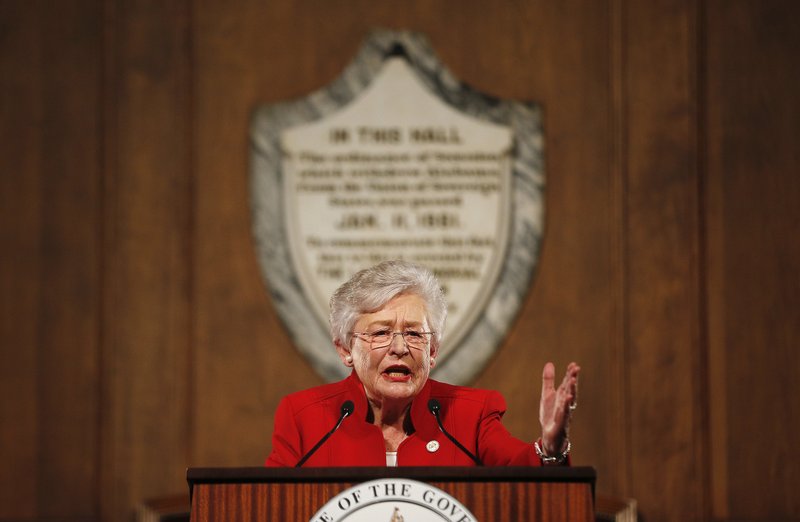
Last week, Alabama governor Kay Ivey released a statement saying the Trump Administration’s new tariffs will cause harm to the Yellowhammer State’s economy. Taking it a step further, she contacted U.S. Secretary of Commerce Wilbur Ross and several members of the Alabama congressional delegation expressing her concerns. “Import tariffs, and any retaliatory tariffs on American made goods, will harm Alabama, the companies that have invested billions of dollars in our state, and the thousands of households which are dependent upon those companies for a good-paying job,” Ivey said in a statement. “I strongly oppose any efforts that may harm those companies that employ thousands of Alabamians and contribute billions to our economy. I am committed to protecting Alabama jobs and consumers, the world over, who are proud to purchase products made in Alabama.” In her letter to Ross, Ivey touted Alabama’s record year in 2017 citing the nearly $3 billion in automotive-related investments, the announcement of a new Mazda-Toyota plant, and the more than 57,000 Alabamians who are already employed by the sates manufacturing sector. “In 2017, Alabama produced almost one million cars and light trucks and 1.7 million engines. However, Alabama’s success relies on access to foreign markets and imports of certain automotive components that become part of the vehicles produced in our state,” Ivey’s letter read. “Last year, Alabama reached a record high of $21.7 billion in exports. Our top export category was automotive, accounting for $10.9 billion of those exports. The largest importers of Alabama made goods and services were Canada, China, Germany, Mexico and Japan – all countries which may be forced to reciprocate in response to any new import tariffs.” Ivey ended her letter to Ross by saying that tariffs places on imported materials used for car manufacturing, and tariffs placed on the state’s exported vehicles would increase costs and cause a high number of Alabamians to lose their jobs. “Estimates show that a ten percent decrease in Alabama-made vehicle exports could result in the loss of approximately 4,000 jobs in Alabama,” the letter continued. “Such a loss would be devastating to thousands of families across our state. These are Alabama families who are dependent on the income from working in these facilities.” “As Governor of the Great State of Alabama, I strongly oppose any efforts that may harm those companies that employ thousands of Alabamians and contribute billions to our economy. I respectfully ask that you not recommend to President Trump the levying of trade tariffs on automobiles and automotive parts.”
U.S. Navy document reveals plans to house immigrants in Alabama tent cities
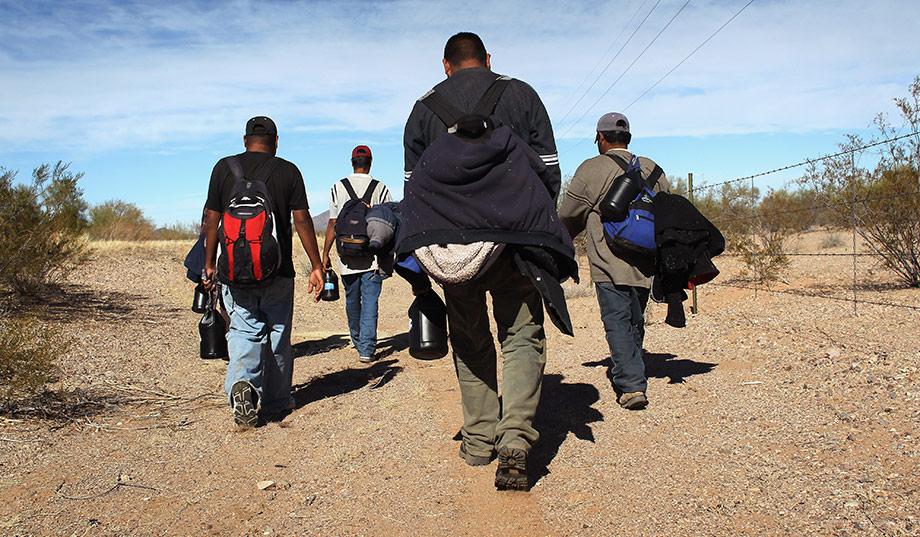
Alabama could be the new home of one of the controversial tent cities used to house illegal immigrants by the Trump administration. According to an exclusive report published by TIME magazine on Friday afternoon, the U.S. Navy is preparing to construct several new detention centers across the nation; with plans for one being placed at the Navy Outlying Field Wolf, and Navy Outlying Field Silverhill near Orange Beach, Ala. The new “tent city” could offer room for as many as 25,000 illegal immigrants detained at the border and transported to the Yellowhammer State. The immigrants could be housed in the new detention center for as long as a year, according to TIME. “Although the military has not yet been ordered to construct these new detention facilities, it is clear it bracing to join a policy challenge that is ricocheting throughout the whole of government,” continued the report. “What began as a crackdown on immigrants crossing the border illegally has now spread to the departments of Justice, Homeland Security, Defense and Health and Human Services.” The report comes in the wake of President Donald Trump‘s new “zero-tolerance” immigration policy announced by Jeff Sessions in May. “If you are smuggling a child then we will prosecute you, and that child will be separated from you as required by law,” Sessions said Monday at a law enforcement event in Scottsdale, Ariz. “If you don’t like that, then don’t smuggle children over our border,” said Sessions, according to TIME. “If you cross this border unlawfully, then we will prosecute you. It’s that simple,” Sessions added, describing the new policy as zero tolerance. “We are dealing with a massive influx of illegal aliens across our Southwest Border. But we’re not going to stand for this.”
Lower costs, fewer benefits in new Trump administration health insurance option
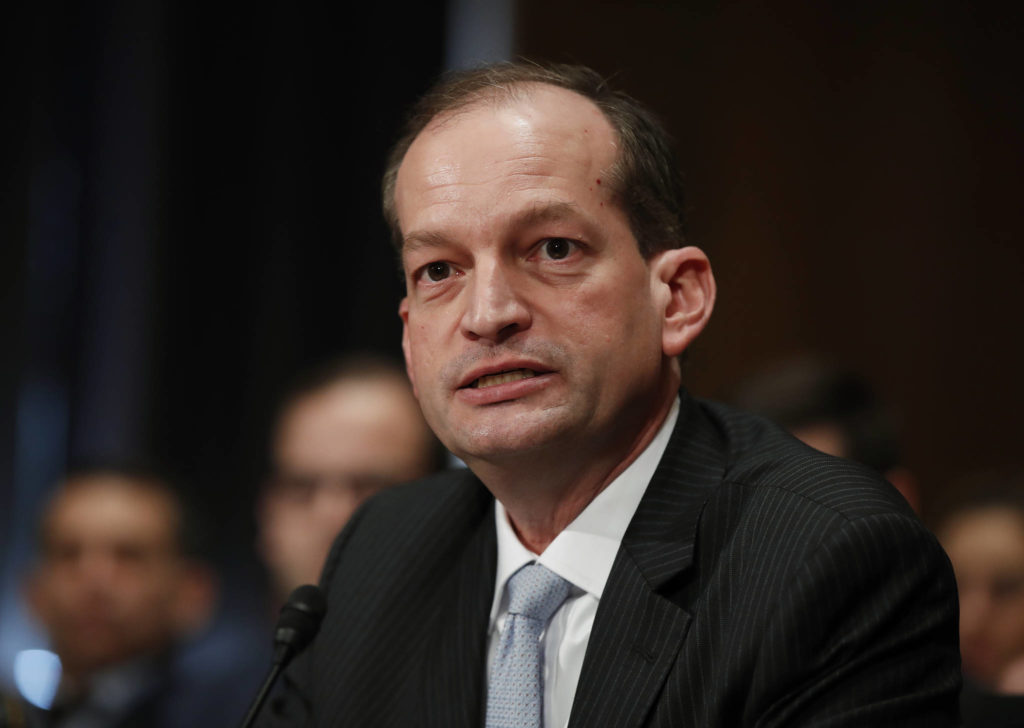
The Trump administration Tuesday rolled out a health insurance option for small businesses and self-employed people that could lead to lower premiums but may also cover fewer benefits than current plans. Labor Secretary Alex Acosta said the new “association health plans” will allow small business to pool their purchasing power, gaining access to some of the advantages that large employers have in the health insurance market. “Today the Trump administration helps level the playing field between large companies and small businesses,” Acosta said. “This expansion will offer millions of Americans more affordable health care options. The new plans would retain the same protections for people with pre-existing conditions, older workers, and women, that large company plans now have, Acosta added. Details were expected later Tuesday. The plans could be marketed across state lines within a geographic region to businesses in a given industry — auto repair shops, for example. Or a local chamber of commerce could sponsor one in a given community. The plans could be sold to self-employed people, like musicians. Allowing interstate marketing within a geographic region represents a shift from the original concept that the plans would be offered nationwide. President Donald Trump has long asserted that promoting the sale of health insurance across state lines can bring down premiums without sacrificing quality. But many experts weren’t convinced, because medical costs vary greatly according to geography. Ultimately, the idea’s success depends on buy-in from plan sponsors, consumers, insurers and state regulators. No major consequences are expected for people covered by large employers. Acosta cited enrollment estimates that predict a modest impact: about 4 million people covered by the plans within a few years, including 400,000 who would have been uninsured. Compare that to the total number of about 160 million covered by job-based insurance. After Republicans hit a dead end trying to repeal the Affordable Care Act, the Trump administration has pushed regulatory actions to loosen ACA requirements and try to lower premiums for individuals and small businesses, which now reflect the cost of comprehensive coverage. Another major initiative is expected later this summer when the administration eases rules for short-term health plans lasting less than a full year that could be purchased by individuals. Those plans wouldn’t have to cover people with pre-existing conditions, but would offer healthy people much lower premiums. Critics say the administration’s approach will draw healthy people away from the Obama health law’s insurance markets, raising the cost of coverage, which is subsidized by taxpayers. About 11 million people are covered by HealthCare.gov and state markets, but the administration’s priority is to try to lower premiums for another 7 million or so who buy their coverage directly and don’t get any help from the government. “To the extent that these plans develop and serve as a parallel market, that could have a destabilizing effect,” said Karen Pollitz of the nonpartisan Kaiser Family Foundation, an expert on individual health insurance. Pollitz also served as a consumer protection regulator in the Obama administration. “People who think they can get by without those (comprehensive) benefits will look for cheaper premiums,” she added. State insurance regulators have been concerned about association health plans because similar plans in the past had problems with financial solvency and fraud. Administration officials said Tuesday that states and the federal government would share regulatory oversight of the plans, with states retaining their current authority. The new plans will be phased in, starting in September. A small business group called Job Creators Network welcomed the Trump administration move. Group president Alfredo Ortiz said it “will create more options, more competition, and lower costs for Main Street small businesses.” Republished with the permission of the Associated Press.
U.N. calls on U.S. to halt separations of migrant families
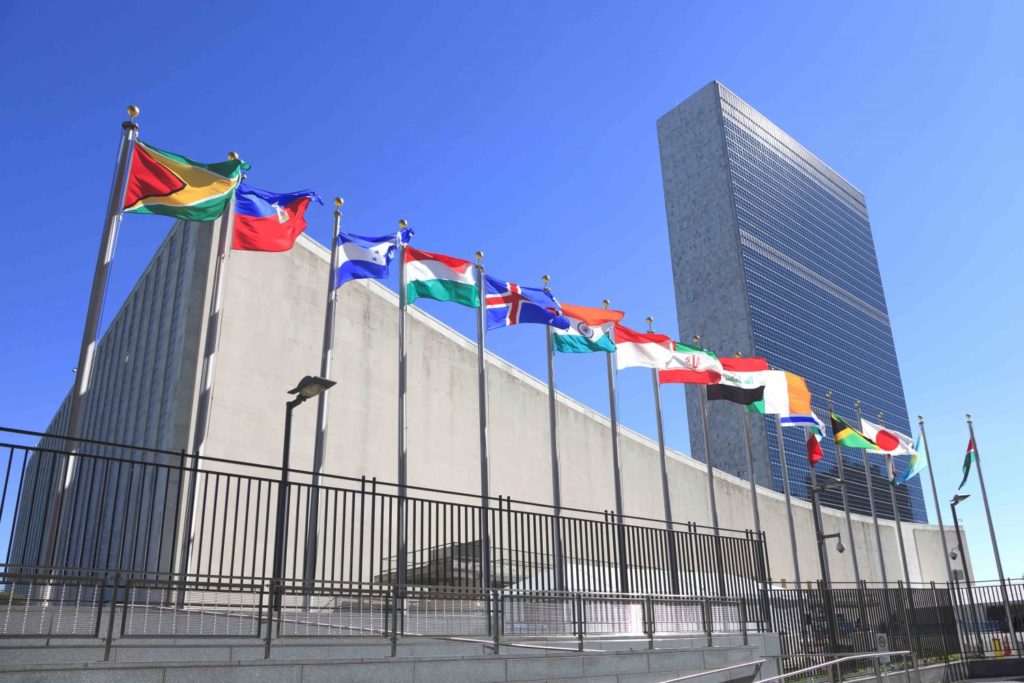
The U.N. human rights office is calling on the Trump administration to “immediately halt” its policy of separating children from their parents after crossing U.S. border with Mexico. Rights office spokeswoman Ravina Shamdasani scolded the U.S. for its “zero tolerance” policy in which some families have been separated after migration across the border. The rights office said in a statement that “children should never be detained for reasons related to their own or their parents’ migration status. Detention is never in the best interests of the child and always constitutes a child rights violation.” Shamdasani told a U.N. briefing Tuesday that the practice of separating families amounted to an “arbitrary and unlawful” interference in family life, calling it a “serious violation” of the rights of children. Republished with the permission of the Associated Press.
Trump administration considers plan to bail out struggling coal, nuclear plants

The Trump administration is considering a plan to order operators of the nation’s power grid to buy electricity from struggling coal and nuclear plants to keep them open. The action by the Energy Department would represent an unprecedented intervention into U.S. energy markets. A draft memo urges federal action to “stop the further premature retirements of fuel-secure generation” from coal and nuclear plants that have struggled to compete with natural gas and renewable energy sources such as wind and solar power. The Associated Press obtained a copy of the memo. The plan would direct grid operators to buy power from coal and nuclear plants for two years to ensure grid reliability, “promote the national defense and maximize domestic energy supplies.” The memo was first reported by Bloomberg News. Republished with the permission of the Associated Press.
Former Ala. staffer, Trump Deputy Chief of Staff Rick Dearborn to step down
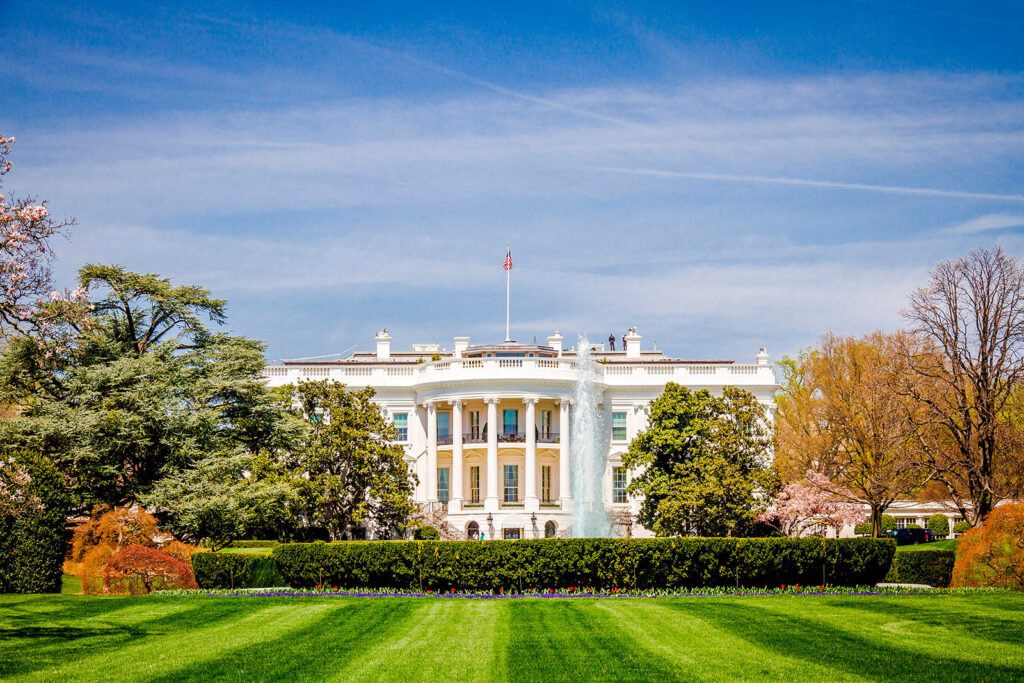
White House Deputy Chief of Staff Rick Dearborn, a former Alabama staffer, will step down early 2018 to pursue a career in the private sector, White House Chief of Staff John Kelly announced Thursday. Dearborn, who served as chief of staff for former U.S. Sen. Jeff Sessions, joined President Donald Trump‘s White House in January. There, he oversaw political operations, public outreach and legislative affairs and has been an integral part of Trump’s effort to manage relations on Capitol Hill. Well respected among Republican leadership and their aides, he also had previous executive branch experience, having served as Assistant Secretary of Energy for Congressional and Intergovernmental Affairs. The Wall Street Journal reports, “Rick loyally served the president for two and a half years and brought tremendous energy to the White House staff,” Kelly said in a statement Thursday. “He’s a super guy and it breaks my heart to see him leave, but I look forward to his continued personal friendship and support for the president’s agenda.” Dearborn told Fox News that his departure is “bittersweet,” but he reportedly told White House officials he saw the final passage of the Republican tax reform bill as a finale for his time in the Administration. He will stay in the position for the first month or two of the next year.
James Comey: Donald Trump administration spread ‘lies, plain and simple’

Former FBI Director James Comey accused the Trump administration Thursday of spreading “lies, plain and simple” about him and the FBI in the aftermath of his abrupt firing, in dramatic testimony that threatened to undermine Donald Trump’s presidency. As he opened his much anticipated first public telling of his relationship with Trump, Comey disputed the Trump administration’s justification for his firing last month, declaring that the administration “defamed him and more importantly the FBI” by claiming the bureau was in disorder under his leadership. And in testimony that exposed deep distrust between the president and the veteran lawman, Comey described intense discomfort about their one-on-one conversations, saying he decided he immediately needed to document the discussions in memos. “I was honestly concerned that he might lie about the nature of our meeting, so I thought it really important to document,” Comey said. “I knew there might come a day when I might need a record of what happened not only to defend myself but to protect the FBI.” Comey made his comments as the packed hearing got underway, bringing Washington and parts of the country to a halt as all eyes were glued on televisions showing the hearing. He immediately dove into the heart of the fraught political controversy around his firing and whether Trump interfered in the bureau’s Russia investigation, as he elaborated on written testimony delivered Wednesday. In that testimony he had already disclosed that Trump demanded his “loyalty” and directly pushed him to “lift the cloud” of investigation by declaring publicly the president was not the target of the FBI probe into his campaign’s Russia ties. Comey also said in his written testimony that Trump, in a strange private encounter near the grandfather clock in the Oval Office, pushed him to end his investigation into former National Security Adviser Michael Flynn. The Senate intelligence committee chairman, Richard Burr of North Carolina, asked Comey the key question about that encounter: “Do you sense that the president was trying to obstruct justice, or just seek a way for Mike Flynn to save face, given he had already been fired?” “I don’t think it’s for me to say whether the conversation I had with the president was an effort to obstruct,” Comey replied. “I took it as a very disturbing thing, very concerning. But that’s a conclusion I’m sure the special counsel will work towards to try and understand what the intention was there and whether that’s an offense.” Later, in a startling disclosure, Comey revealed that after his firing he had tried to spur the appointment of a special counsel by giving one of his memos about Trump to a friend of his to leak to the press. “My judgment was I need to get that out into the public square, ” Comey said. The Republican National Committee and other White House allies worked feverishly to lessen any damage from the hearing, trying to undermine Comey’s credibility by issuing press releases and even ads pointing to a past instance where the FBI had had to clean up the director’s testimony to Congress. Republicans and Trump’s own lawyer seized on Comey’s confirmation, in his written testimony, of Trump’s claim that Comey had told him three times the president was not directly under investigation. Trump himself was expected to dispute Comey’s claims that the president demanded loyalty and asked the FBI director to drop the investigation into Flynn, according to a person close to the president’s legal team who demanded anonymity because of not being authorized to discuss legal strategy. The president has not yet publicly denied the specifics of Comey’s accounts but has broadly challenged his credibility, tweeting last month Comey “better hope there are no ‘tapes’” of the conversations. “Lordy, I hope there are tapes,” Comey remarked at one point, suggesting such evidence would back up his account over any claims from the president. But it was a Democrat, Sen. Dianne Feinstein of California, who asked the question that many Republicans have raised in the weeks since Comey’s firing as one media leak followed another revealing Comey’s claims about Trump’s inappropriate interactions with him. Raising the Oval Office meeting where Comey says Trump asked him to pull back the Flynn probe, Feinstein asked: “Why didn’t you stop and say, ‘Mr. President, this is wrong,’?” “That’s a great question,” Comey said. “Maybe if I were stronger I would have. I was so stunned by the conversation I just took it in.” Comey was also asked if he believed he was fired because of the bureau’s investigation into Russia’s meddling in the 2016 election as well as Russia’s ties with Trump’s campaign. Graphic details opening exchange between James Comey and Senator Richard Burr. “Yes,” Comey said. “Because I’ve seen the president say so.” The hearing unfolded amid intense political interest, and within a remarkable political context as Comey delivered damaging testimony about the president who fired him, a president who won election only after Comey damaged his opponent, Hillary Clinton, in the final days of the campaign. Clinton has blamed Comey’s Oct. 28 announcement that he was re-opening the email investigation for her defeat. She’s argued she was on track to a victory when Comey’s move raised fresh doubts about her. “If the election were on Oct. 27, I would be your president,” Clinton said last month. Many Democrats blame Comey for Clinton’s loss, leading Trump to apparently believe they would applaud him for firing Comey last month. The opposite was the case as the firing created an enormous political firestorm that has stalled Trump’s legislative agenda on Capitol Hill and taken over Washington. Under questioning Thursday, Comey strongly asserted the intelligence community’s conclusion that Russia did indeed meddle in the 2016 election. “There should be no fuzz on this. The Russians interfered,” Comey stated firmly. “That happened. It’s about as unfake as you can possibly get.” Trump has begrudgingly accepted the U.S. intelligence assessment that Russia interfered with the election. But he has also suggested he doesn’t believe it,
Former FBI director James Comey says White House ‘defamed’ him and FBI
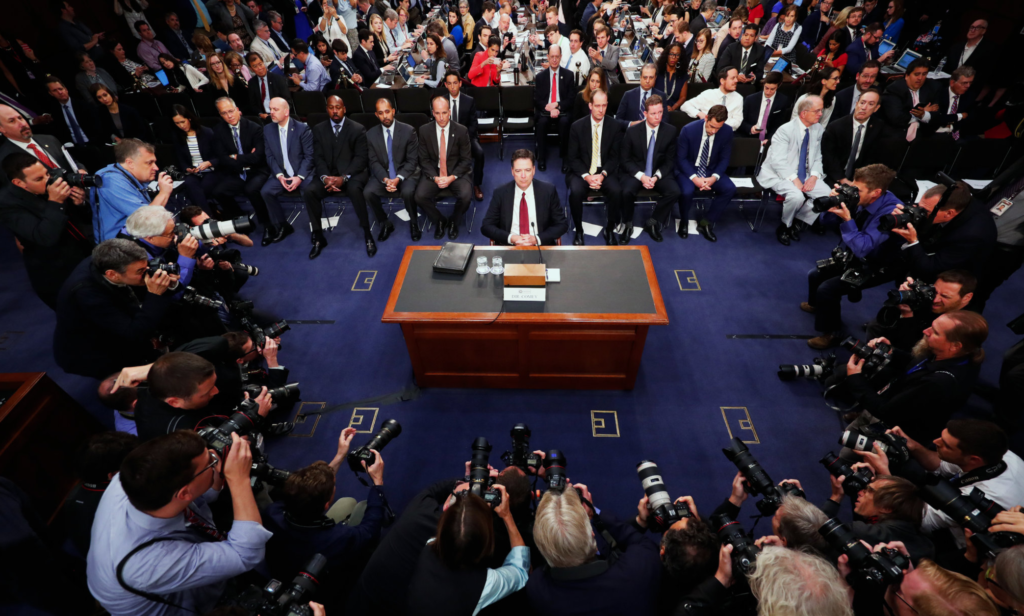
Former FBI Director James Comey accused the Trump administration Thursday of spreading “lies, plain and simple” about him and the FBI in the aftermath of his abrupt firing, in dramatic testimony that exposed deep distrust between the president and the veteran lawman and threatened to undermine Donald Trump’s presidency. Comey disputed the Trump administration’s justification for his firing, declaring the administration “defamed him and more importantly the FBI,” as he opened his much anticipated first public telling of his relationship with Trump. Comey described discomfort about their one-on-one conversations, saying he decided he immediately needed to document the discussions in memos. “I was honestly concerned that he might lie about the nature of our meeting, so I thought it really important to document,” Comey said. “I knew there might come a day when I might need a record of what happened not only to defend myself but to protect the FBI.” Comey made his comments as the packed hearing got underway, bringing Washington and parts of the country to a halt as all eyes were glued on televisions showing the hearing. He immediately dove into the heart of the fraught political controversy around his firing as he elaborated on written testimony delivered Wednesday. In that testimony he had already disclosed that Trump demanded his “loyalty” and directly pushed him to “lift the cloud” of investigation by declaring publicly the president was not the target of the FBI probe into his campaign’s Russia ties. Comey also testified in his written testimony that Trump, in a strange private encounter near the grandfather clock in the Oval Office, pushed him to end his investigation into former National Security Adviser Michael Flynn. Comey also confirmed Trump’s claim that he had told him three times the president was not directly under investigation. The Republican National Committee worked to lessen any damage from the hearing, trying to undermine Comey’s credibility by pointing to a past instance where the FBI had had to clean up his testimony to Congress. And Trump himself was expected to dispute Comey’s claims that he demanded loyalty and asked the FBI director to drop the investigation into Flynn, according to a person close to the president’s legal team who demanded anonymity because of not being authorized to discuss legal strategy. Trump has not yet publicly denied the specifics of Comey’s accounts but has broadly challenged his credibility, tweeting last month Comey “better hope there are no ‘tapes’” of the conversations. But it was a Democrat, Sen. Dianne Feinstein of California, who asked the question that many Republicans have raised in the weeks since Comey’s firing as one media leak followed another revealing Comey’s claims about Trump’s inappropriate interactions with him. Alluding to the Oval Office meeting where Comey says Trump asked him to pull back the Flynn probe, Feinstein asked: “Why didn’t you stop and say, ‘Mr. President, this is wrong,’?” “That’s a great question,” Comey said. “Maybe if I were stronger I would have. I was so stunned by the conversation I just took it in.” Comey was also asked if he believed he was fired because of the bureau’s investigation into Russia’s meddling in the 2016 election as well as Russia’s ties with Trump’s campaign. “Yes,” Comey said. “Because I’ve seen the president say so.” Comey described his concerns that Trump was trying to create a “patronage” relationship with him at a dinner where Trump asked him if he wanted to keep his job. “The statue of justice has a blindfold on because you’re not supposed to be peeking out to see whether your patron is pleased or not with what you’re doing,” Comey said. Senate intelligence committee Chairman Richard Burr is leading the committee’s investigation into Russia’s role in the 2016 election, which is proceeding even as a special counsel recently appointed by the Justice Department also investigates. “We will establish the facts separate from rampant speculation and lay them out for the American people to make their own judgment,” Burr said. “Only then will we be able to move forward and put this issue to rest.” Republished with permission of The Associated Press.
Personnel note: Mo Brooks’ staffer Peter J. White tapped for White House post

President-elect Donald Trump has asked Alabama 5th District. U.S. Rep. Mo Brooks‘ staffer to serve in his Administration. After serving as Brooks’ Legislative Counsel for nearly two-years, Alabama-native Peter J. White will serve as Senior Policy Analyst in the White House Domestic Policy Council. “Alabama’s Fifth Congressional District’s loss is President Donald Trump’s gain,” said Brooks of White’s appointment. “President Trump is immensely fortunate to gain the expertise of Peter J. White as a member of the White House Domestic Policy Council.” According to Brooks, Peter hails from Alabama’s 5th Congressional District and is a fellow graduate of Grissom High School in Huntsville, Ala. Brooks continued, “After receiving his Juris Doctor degree from American University, Peter served as Legislative Counsel in my Washington office, crafting legislation relating to immigration, space, and cybersecurity. He also served as my chief advisor on judiciary and transportation issues. I wish him the best in this new position and commend his selection. The White House is gaining a passionate staffer, dedicated to helping President Trump keep his campaign promises.” White has also worked at the Federal Trade Commission in the Office of International Affairs and the Bureau of Competition, and the Federal Communications Commission’s Spectrum and Competition Policy Division of the Wireless Telecommunications Bureau. At the White House, White will report to a familiar face — another former Alabama staffer, Sen. Jeff Sessions‘ former aide Stephen Miller. As a member of the policy team, White will be required to accept a five-year ban on lobbying after the conclusion of his service as well as a lifetime ban on becoming registered lobbyists for a foreign government.
Joe Henderson: A Donald Trump administration; Too late America, we’re doing this

You ever talk yourself into trying one of those amusement park thrill rides, the kind that turns you upside down and inside out? You told yourself a million times you would never ride that thing, but here you are, strapped into your seat as your car reaches the top of that terrifying first drop. Just before you slip over the edge, you think, “What have I done?” Too late now. You’re doing this. And so, America, welcome to the Trump administration. Polls show considerable buyer’s regret since the election in November, as his approval ratings are at historic lows for an incoming president. Once he puts his hand on the Bible and repeats the 35-word presidential oath, Donald J. Trump will officially be the leader of the free world. Too late now, America. We’re all doing this. Let’s see if what he promised matches the reality of his term. Here are a few of the biggies, in order of the likelihood of the promises being kept. REPEAL AND REPLACE OBAMACARE: That will happen. That process is well underway. But replacing it with “something great” that accomplishes Trump’s stated goal of insuring everyone? That will be President Trump’s first and maybe biggest test of leadership against a hawkish Congress controlled by his own Republican Party. Probability of repeal and replace: 100 percent. Probability that a majority of Americans will accept it when they realize their favorite part of Obamacare no longer exists: 10 percent. APPOINT A CONSERVATIVE JUDGE TO THE SUPREME COURT: Book it. Probability: 100 percent. DEPORT 11 MILLION ILLEGAL IMMIGRANTS: That was a promise that helped Trump skyrocket with voters who blame illegal immigrants for everything except global warming (because that’s a hoax, right?). Since the cost of fulfilling that promise has been estimated at $600 billion minimum, there zero probability of that happening. But … there are reports that the new administration is ready to immediately implement what surely will be a selective high-profile sweep of illegals. Maybe that will be enough for Trump to declare victory. OVERHAUL THE VETERANS ADMINISTRATION: I think if that could be done, President Obama would have accomplished it. The disasters at Veterans Affairs were one of Obama’s greatest failings. Trump will take a swing. Heads will roll. Heads should roll, and we know how good he is at saying “You’re fired.” So, yeah: Probability he will try: 100 percent. Probability he will succeed: 30 percent. THE WALL: Yes, that wall he promised along the southern border between the U.S. and Mexico can be built. He can back up his vow to make Mexico pay for it by deductions in foreign aid, tariffs on Mexican imports, and so on. But governing is different from campaigning. I don’t think this is a sure thing. Probability: 80 percent. OVERHAUL TRADE AGREEMENTS TO PUT AMERICA FIRST: Trump’s tough talk on this issue probably won him the election by appealing to disenfranchised Midwestern voters. But every action triggers a reaction, and just ditching things like NAFTA and imposing massive tariffs on imports could send the economy over the edge of our mythical thrill ride. This likely will be one where Trump gets a couple of treaties rewritten and declares victory. But for the kind of impact he envisions and promised? Probability: 40 percent. ALSO, THESE: Prosecute Hillary Clinton (zero percent) … Allow waterboarding and other means of torture slipped to 2 percent after incoming defense secretary James Mattis told Trump it doesn’t work … Leave Social Security and Medicare alone (95 percent). … Cut taxes (100 percent) … Reduce the national debt (zero percent; can’t cut taxes, increase infrastructure and other spending, leave social safety nets alone, and expect to reduce the national debt). And finally … BE UNPREDICTABLE: Even Vegas wouldn’t offer book on this one. Probability: Infinity to the 10-millionth power. ___ Joe Henderson has had a 45-year career in newspapers, including the last nearly 42 years at The Tampa Tribune. He has covered a large variety of things, primarily in sports but also hard news. The two intertwined in the decade-long search to bring Major League Baseball to the area. Henderson was also City Hall reporter for two years and covered all sides of the sales tax issue that ultimately led to the construction of Raymond James Stadium. He served as a full-time sports columnist for about 10 years before moving to the metro news columnist for the last 4 ½ years. Henderson has numerous local, state and national writing awards. He has been married to his wife, Elaine, for nearly 35 years and has two grown sons — Ben and Patrick.


